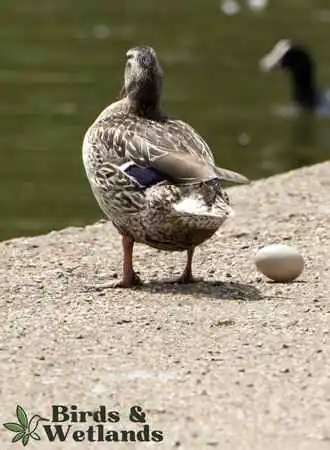Wild and pet ducks are some of the most interesting creatures on the planet. Not only do they have a complex social life, but they can also change gender.
Ducks cannot change their gender in the same way some other animals can. However, some female ducks can develop male characteristics due to hormonal imbalances, usually caused by an ovarian dysfunction. This phenomenon, known as ‘sex reversal’, is rare and does not result in a complete gender change as the affected duck remains genetically female.
Key Takeaways on Can Ducks Change Gender
Female ducks can change their gender if they lose their functional ovary to an infection or injury.
Due to not having ovaries, male ducks can’t gender as female ducks do.
The female duck’s ability to change her gender is believed to be present in many duck species including Mallards and Mandarin duck breeds.
Can Female Ducks Change Gender?

Many people wonder, can ducks and birds change sex? The answer to this question is yes.
Ducks can change genders but only female to male. For many years, the phenomenon of female ducks changing gender due to hormonal changes has piqued the interest of bird enthusiasts.
The female duck starts transitioning after the loss of a functioning ovary. In most cases, ducks lose their ovaries due to some form of infection. This loss can cause significant hormonal changes, resulting in the development of male secondary sex characteristics in the female, such as larger body size, thicker legs and feet, male plumage or drake feathers, and more comb-like growths on the head and neck.
Some ducks may be more susceptible than others to gender transition. This indicates that genetic factors may play a role in the process.
Regardless of the cause, it is a fact that some female ducks can change their gender in response to hormonal changes caused by the absence of an ovary.
Despite being an intriguing phenomenon, this ability can be extremely detrimental to the survival of many ducks in the wild.
If a duckling hatches in an environment with only males, its chances of survival are significantly lower than those of its female peers without an ovary.
Why Do Female Ducks Change Gender?
In ducks and other bird species, the loss of just one functional ovary can profoundly affect the animal’s gender or sex. In female ducks, each egg is produced by a single ovary. This means that a female duck’s eggs are contained in a single ovary, and if this ovary is damaged or lost, the duck may lose her ability to produce estrogen. Due to the lack of estrogen in cases of ovary failure, this estrogen is crucial for counteracting the effects of male genes in female ducks.
A female duck’s behavior and appearance can undergo significant alterations without estrogen. Some ducks may exhibit courtship behaviors typically associated with males, such as chasing other ducks and displaying territorial aggression. The loss or failure of an ovary causes an increase in testosterone levels and a decrease in estrogen production, which results in these behavioral changes.
Additionally, some female ducks may undergo similar physical changes to male ducks, including plumage and color dimorphism. The transitioned male ducks are also capable of fertilizing eggs, which is incredible.

Can a Female Duck Develop Male Plumage?

When a female duck loses her functional ovary, she will develop a male’s colorful plumage. This is because the hormonal changes caused by the loss of this reproductive organ cause the bird’s gender to change and she starts reverting to a male appearance.
As anyone who has seen ducklings can attest, male and female ducks have significantly different plumage, with males sporting more brightly colored feathers. Since males tend to have colorful plumage, the transitioning female will eventually have the same colorful plumage and lose her dull brown feathers.
Interestingly, the hormonal changes triggered by ovary loss do not immediately transform female plumage into male plumage. Rather, it takes time for male characteristics and other male features to fully develop.
Will a Female Duck Develop Male Sexual Organs After Losing Her Ovary?
When a female loses her ovary, she will start developing male sexual organs. Without estrogen, the female reproductive tract masculinizes and assumes male sexual characteristics.
For example, the vestigial ovary transforms into a proper functional testes, which produces fertile sperm capable of fertilizing the eggs of another female duck. This means, not only will a female duck change appearance, she will also function as a male sexually during the breeding season or egg-laying season.
Are Mallard Ducks the Only Ducks That Can Change Genders?
It is a common misconception that only female Mallard ducks can change their gender. While there is still a lot that we don’t know about duck biology, it is clear that all types of ducks can exhibit gender change. However, it should be noted that only females can change genders.
Can a Male Duck Turn Into a Female?

Due to the lack of ovaries, it is physiologically impossible for male ducks to turn into females. Gender change can only occur in female ducks during ovary loss.
The worst thing that can happen to male ducks from a reproductive standpoint is to become sterile due to injuries, infections or genetic defects. If this is the case, the male duck is incapable of reproduction.
Additional Information on Female-to-Male Transition in Ducks
The male sexual characteristics coded in ducks’ chromosomes are different than that of humans. This particular trait is why female ducks can change their gender.
Male Mandarin ducks develop their orangey tail feathers and red plumage to entice potential mates. Male Mallard ducks on the other hand attract females by bobbing their heads.
Male is the duck’s default gender. In humans, the default sex is female.
FAQs on Can Ducks and Other Birds Change Gender
How Many Ovaries Do Ducks Have?
Ducks and many female birds have two ovaries, but only one is functional. With just a single functional ovary, female ducks literarily have all her eggs in one basket.
The left ovary, which is the functional of the two, produces estrogen. Estrogen in birds functions similarly to human testosterone, which inhibits the production of female hormones, but in reverse. Without it, a female duck will transition into a male duck.
The non-functional ovary, the right ovary, is just a tiny ball of cells with no known purpose.
Do Male Ducks Lay Eggs?

Male ducks don’t lay eggs because they don’t have ovaries. Only the female ducks carry out egg-laying. After mating, most male ducks or drakes stay with their mates until after their eggs hatch into ducklings. While the female duck incubates the eggs, the male duck will stand nearby to watch for predators. Most of the time, male ducks leave the female once all their eggs hatch.
How Is Sex Determined in Ducks?
During mating season, the male duck provides the small cells while the female duck provides the large cells. Fertilization only happens when the usual genetic information came from sources of the same species.
The genetic control of the larger and smaller reproductive cells and the corresponding sexual characteristics is provided by each cell.
Generally, the chromosomes determine sex of ducks. The sex chromosomes in birds are known as Z and W. The presence of the W chromosomes results in a female duck. ZZ chromosomes result in the male gender.

Jim Addison is an avid bird watcher and has been obsessed with the activity since he was a young boy.
He has traveled all over North America in search of new and interesting species to observe, and his detailed knowledge of the subject makes him a sought-after expert on the topic.

